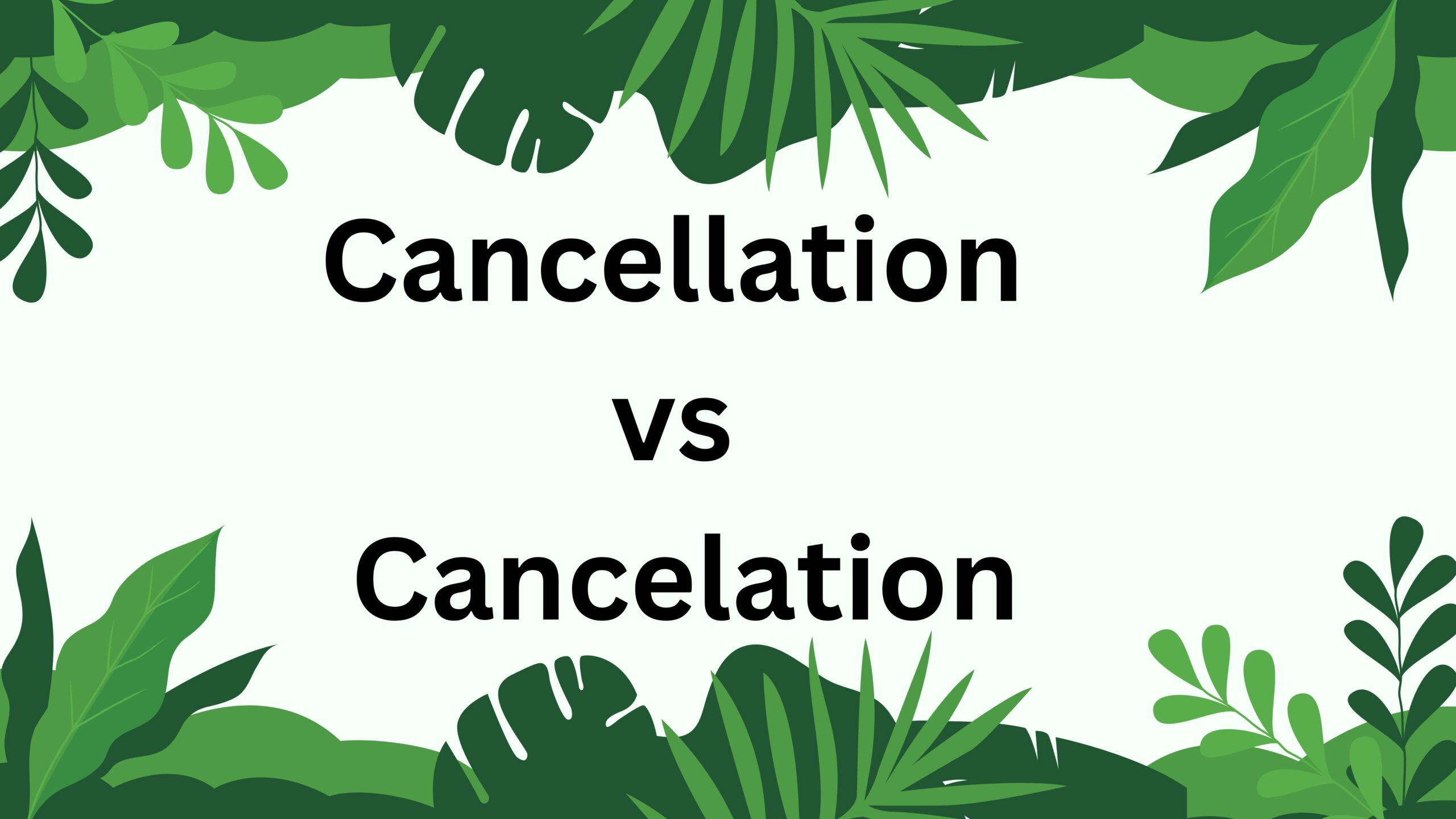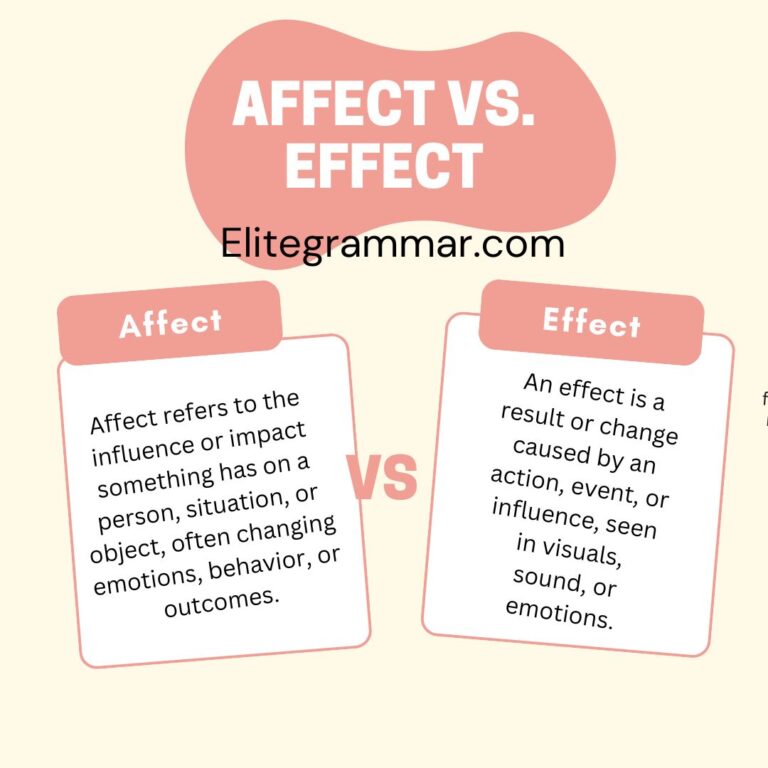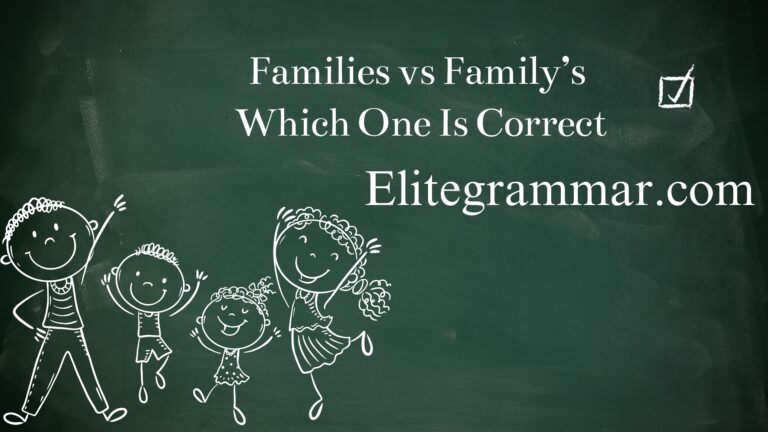Cancellation vs Cancelation: Which Spelling is Correct?
When it comes to spelling differences, the English language is sometimes confusing. “Cancellation vs Cancelation” is a good example. You are not alone in wanting to know which of these two words is correct. Let’s look at the differences and see what is best used in various situations.
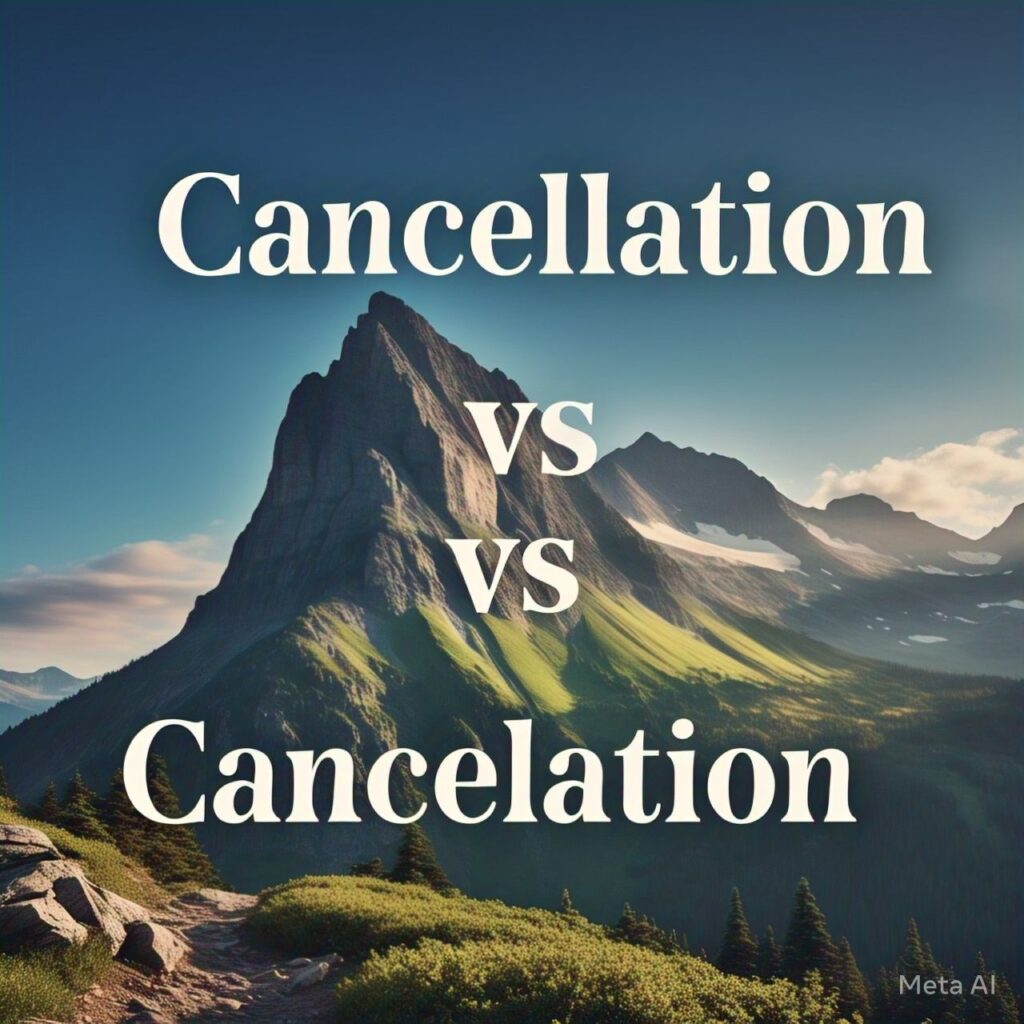
Cancellation or Cancelation – Which One is Grammatically Correct?
English spelling can be tricky, and the words “cancellation” or”cancelation” often cause confusion. Both spellings exist, but which one is correct? Let’s break it down with a detailed explanation.
The Difference Between Cancellation or Cancelation
Both “cancellation” and “cancelation” are noun forms of the verb “cancel”, meaning to call off or terminate something. The main difference between them lies in spelling variations based on regional preferences.
- Cancellation (Double “L”) – This is the standard spelling in British English and widely used in American English.
- Cancelation (Single “L”) – This variation is seen in American English, but it is much less common.
In most formal and professional writing, “cancellation” is the preferred and widely accepted spelling.
British English vs. American English Usage
English spelling often differs between British and American English, and this word is a perfect example.
| Word | British English | American English |
| Cancellation | ✅ Preferred spelling | ✅ Preferred spelling |
| Cancelation | ❌ Rarely used | ⚠️ Less common but acceptable |
In general:
- British English follows the rule of doubling the “L” when adding suffixes (e.g., “travelling,” “counselling,” “modelling”).
- American English tends to simplify spelling (e.g., “traveling,” “counseling,” “modeling”).
Despite this pattern, “cancellation” remains the dominant spelling in both dialects.
Usage in Dictionaries and Official Sources
Let’s see how major dictionaries define these words:
- Merriam-Webster (American English): Lists “cancellation” as the primary spelling but acknowledges “cancelation” as a variant.
- Oxford English Dictionary (British English): Recognizes only “cancellation” as correct.
- Cambridge Dictionary: Recommends “cancellation” for both British and American English.
Most official documents, publications, and professional writing use “cancellation” as the standard spelling.
Which One Should You Use?
✅ If you want to follow standard English spelling rules, always use “cancellation”.
✅ If you’re writing for an American audience, “cancelation” may be recognized, but “cancellation” is still preferred.
✅ If you’re writing for an international audience, “cancellation” is the safest choice.
Examples in Sentences
✅ Correct Usage:
- The cancellation of the flight disappointed many passengers.
- Due to unforeseen circumstances, the event’s cancellation was unavoidable.
- He received a full refund after the hotel confirmed his cancellation request.
⚠️ Alternative (Less Common) Usage:
- The cancelation of the meeting was announced this morning.
(This spelling is acceptable in American English but rarely used.)
What Do “Cancellation” and “Cancelation” Mean?
Both “cancellation” and “cancelation” refer to the act of calling off or terminating something, such as an event, service, or agreement. For example, a flight cancellation means the flight is no longer scheduled to operate, while a subscription cancellation means the service has been discontinued.
Although both spellings convey the same meaning, “cancellation” with two “L’s” is the preferred and more widely accepted spelling in both British and American English. The one-“L” version, “cancelation,” is less common and mostly seen in some American texts. However, “cancellation” remains the standard spelling used in professional and formal writing.
“Cancellation vs Cancelation”: Which Spelling Should You Use?
Did you ever wonder which is the better use: “cancellations or cancelations”? Even though both forms are in actual use, one is preferred to the other. The widely accepted correct form is cancellation especially in British usage. For American English usage, the spellings cancelation are used now and then but far less so.
Why Do American and British English Differ in the Use of Single or Double “L”?
The difference in usage of single and double “L” in British and American English results from historical spelling reforms and geographical reasons. American English is generally inclined to adopt simplified spellings, whereas British English uses the more classic form. An apt example is the difference between travelling (British) and traveling (American).
This divergence began with Noah Webster, an American lexicographer, who tried to standardize Americans’ spelling in the 19th century. Webster preferred more phonetic and simplified spellings to develop the language as rational and less complex as possible. As a result of his changes, American English prefers to use one “L” for words like “cancel” and “label,” whereas British English uses two “L”s. While both English forms are correct in their locations, the differences are reflective of the evolution of the language and cultural affinity towards spelling.
Understanding the Spelling Debate
The debate over cancelation and cancellation has been going on for a while. Different places use different spellings. In British English, people prefer cancellation. In American English, cancelation or canceled is more common.
To understand canceled or cancelled, knowing their history is key. This background helps us see why there’s a debate.
When talking about cancellations or cancelations, it’s important to know the difference. The word “cancel” comes from Latin, meaning “to cross out”. This has led to the debate between cancelation and cancellation. The choice depends on the context and where you are.
Regional spelling preferences: British English tends to use cancellation, while American English uses cancelation or canceled.
Historical context: The word “cancel” originated from the Latin word “cancel”, which means “to cross out”.
Usage in different contexts: Cancellations or cancelations may be used in various contexts, such as business, law, or everyday conversation.
Knowing the history and regional differences helps us decide between cancellation and cancelation. It also helps us understand canceled or cancelled better.
American vs. British English Spelling Rules
The spelling difference between “cancelled” and “canceled” shows a clear divide between American and British English. In American English, “canceled” is the preferred choice. On the other hand, British English keeps the “u” and uses “cancelled”. This variation comes from regional English differences, with Americans often removing the “u” in words like this, and the British keeping it.
Knowing these regional differences is key for keeping your writing consistent. It’s important when dealing with language preferences that affect correct spelling. Even though “cancelled or canceled” means the same in both, the spelling change can greatly affect a sentence’s correct spelling.
In the U.S., American English is the main language, and writers are usually told to use “canceled”. In contrast, the UK uses British English, which spells it “cancelled”. Your choice between these two spellings depends on your language preferences or the publication’s style.
The main differences in spelling rules between American and British English are:
- American English: canceled
- British English: cancelled
- Both: The meaning of “cancelled or canceled” remains the same.
By understanding and respecting these differences, writers can make sure their writing is correct and consistent. This is true, no matter the language preferences of their readers.
Grammar Rules for “Cancelled or Canceled”
“Cancelled” and “canceled” are both verbs. They have the same forms for present, past, and past participle. Knowing these forms helps you use the words right in sentences. The right choice depends on the situation and where you are, like the difference between canceled and cancelled.
To spell cancelation or cancellation right, you need to know the verb forms. The present tense is “cancel”. The past tense can be “canceled” or “cancelled”. The past participle is also “canceled” or “cancelled”. It’s all about the context and where you are, like how to spell canceled in American English.
Here are some key points to consider when using “cancelled” and “canceled”:
- Both “canceled” or “cancelled” can be used as verbs, with the same verb forms.
- The correct usage of the words depends on the context and regional preferences.
- Understanding the verb forms, including the present tense, past tense, and past participle, is essential for correct usage.
In summary, “cancelled” and “canceled” follow similar grammar rules. The right choice depends on the situation and where you are. By knowing the verb forms and regional spelling, you can use these words correctly in your writing. This way, you’ll know how to spell cancelation or cancellation right.
Related Forms: Canceling vs. Cancelling
Exploring “cancelled” and “canceled” shows us the importance of related forms like “canceling” and “cancelling”. These verb forms, the present participle and gerund, are key to using them right. To spell cancellation correctly, think about the context and where you are, as “cancel” changes based on these.
In American English, “canceling” is the go-to, but in British English, “cancelling” is preferred. To spell cancelled or canceled right, knowing the difference is crucial. The right word choice depends on the situation and where you are, making it key to know how to spell cancelled correctly in different places.
Here’s a quick rundown of the related forms:
- Canceling (American English)
- Cancelling (British English)
- Cancelled (past tense, American and British English)
- Canceled (past tense, American English)
Knowing the related forms of “cancelled” and “canceled” helps improve your writing. It keeps you from getting confused when using these words in different settings. Whether it’s how to spell cancellation correctly or how do you spell cancelled correctly, grasping these differences is vital for clear communication.
Cancelled vs Canceled: Definition
Both “cancelled” and “canceled” are the past tense forms of the verb “cancel”, meaning to revoke, annul, or call off something. The difference between the two lies in the spelling convention:
- “Cancelled” is the preferred spelling in British English, following the tradition of retaining double consonants in words like “travelling” and “cancelled.”
- “Canceled” is the preferred spelling in American English, where the general trend is to simplify words by using a single consonant.
Despite the spelling difference, both words have the same meaning and can be used interchangeably based on the regional variant of English.
What About Other Words That Come From Cancel?
Cancellation – The act of canceling something (e.g., The cancellation of the event disappointed many people.)
Canceled (or Cancelled, in British English) – The past tense of cancel (e.g., The meeting was canceled due to bad weather.)
Canceling (or Cancelling, in British English) – The present participle of cancel (e.g., She is canceling her subscription.)
Cancelable (or Cancellable) – Something that can be canceled (e.g., This flight ticket is non-cancelable.)
Cancelation – An alternative spelling of cancellation, more common in American English but less used.
Canceler (or Canceller) – A person or thing that cancels something (e.g., The flight canceler informed the passengers about the delay.)

Does the Rule Apply to ing Endings Too?
Yes, the spelling rule for cancel applies to -ing endings as well, but it depends on whether you’re using American or British English.
- American English → canceling
- British English → cancelling
Why the Difference?
The rule is based on how words ending in -l behave when adding a suffix:
- In American English, a final -l is not usually doubled unless the stress is on the last syllable (travel → traveling, cancel → canceling).
- In British English, the -l is doubled more consistently (travelling, cancelling).
This rule also applies to other forms like cancelled vs canceled and cancellation (which always has a double “l”).
And Do Other Words Behave This Way?
Yes! Many other words follow the same pattern, especially verbs ending in -l when adding -ing or -ed. Here are some examples:
Words That Follow the Cancel → Canceling/Cancelling Pattern:
| American English | British English |
| traveling | travelling |
| canceled | cancelled |
| modeling | modelling |
| fueled | fuelled |
| labeling | labelling |
| dialing | dialling |
Why Does This Happen?
- In American English, a single L is used before adding -ing or -ed, unless the stress is on the last syllable (control → controlling).
- In British English, the L is usually doubled more consistently.
Is There a General Rule I Can Follow?
The British English Rule
- In British English, verbs ending in -l almost always double the “L” before adding -ing or -ed.
- Example: travel → travelling, cancel → cancelling, fuel → fuelled
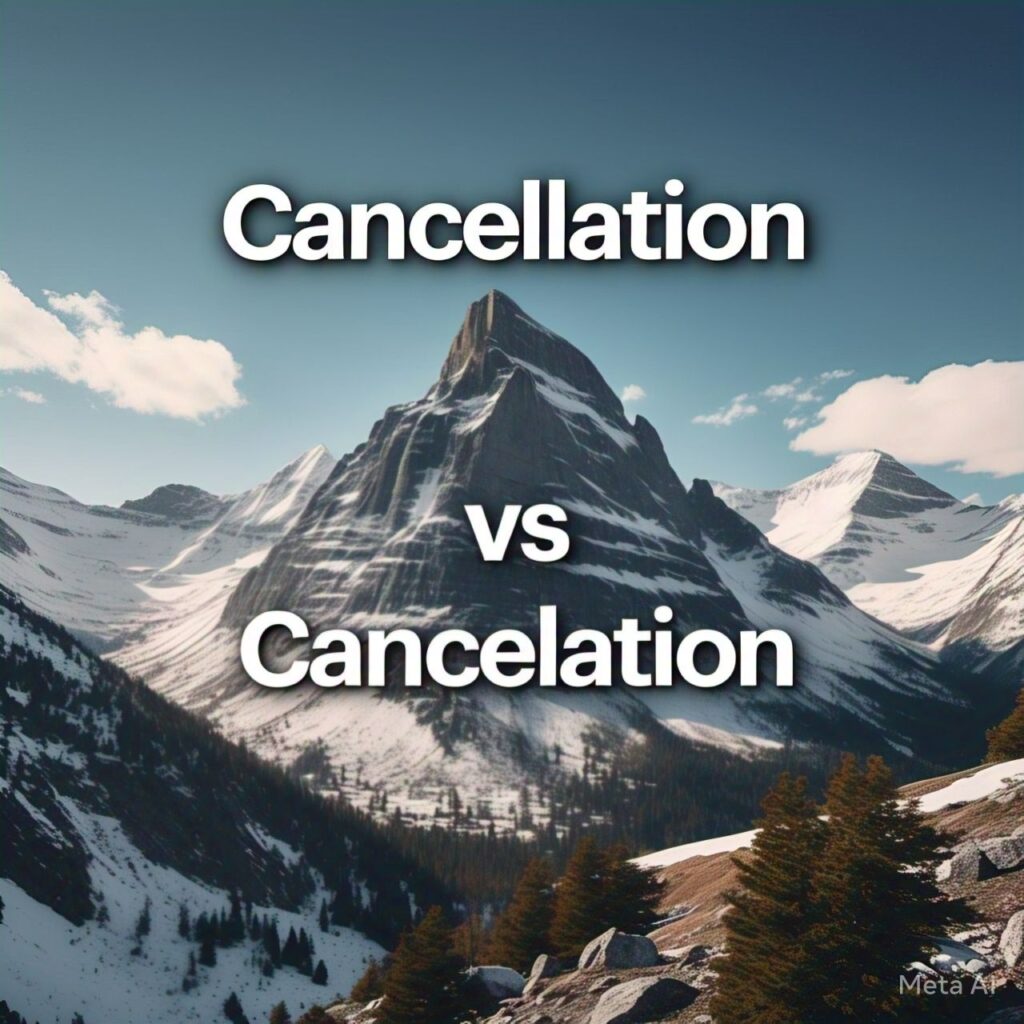
The American English Rule
- In American English, the final “L” is only doubled if the last syllable is stressed.
- Example: control → controlling (stress is on conTROL)
- Example: cancel → canceling (stress is on CANcel, so no doubling)
Quick Guide:
1. If the last syllable is stressed → Double the L in both British & American English
2. If the stress is NOT on the last syllable →
- British English → Always double the “L”
- American English → Keep it single
Synonyms of “Cancellation”
“Cancellation” refers to the act of stopping, voiding, or calling off a planned event, agreement, or service. It indicates that something previously scheduled will no longer take place.
- Termination – Ending something officially, such as a contract or agreement.
- Annulment – Declaring something legally invalid, like a marriage or contract.
- Revocation – Taking back or withdrawing a decision, right, or privilege.
- Abolition – Completely removing or banning something, often a law or practice.
- Rescission – Cancelling a contract or agreement to restore previous conditions.
- Invalidation – Making something legally or officially void.
- Withdrawal – Removing or taking back an offer, statement, or agreement.
- Suspension – Temporarily stopping or delaying an event or action.
- Dissolution – Officially ending an organization, partnership, or legal entity.
- Reversal – Changing a previous decision or ruling to the opposite outcome.
Examples in Context
- The cancellation of the concert disappointed thousands of fans.
- Due to bad weather, the airline announced the cancellation of several flights.
- The company issued a full refund after the cancellation of the order.
- The hotel has a strict cancellation policy requiring 24-hour notice.
- His sudden cancellation of the meeting raised suspicions.
- The government announced the cancellation of the new tax policy.
- The streaming service allows easy cancellation of subscriptions at any time.
- After repeated delays, the event’s cancellation seemed inevitable.
- The contract included a clause for early cancellation without penalties.
- The school’s cancellation of classes due to snow was welcomed by students.
- A last-minute cancellation by the keynote speaker disrupted the conference.
- The cancellation of her credit card prevented fraudulent transactions.
Origins of “Cancellation”
The word “cancellation” originates from the Latin verb “cancellare,” meaning “to cross out” or “to make lattice-like marks” on a document to indicate nullification. It evolved into Old French as “canceller” and later entered Middle English as “cancel,” meaning to annul or void something. By the 17th century, the noun “cancellation” emerged, referring to the act of revoking or invalidating an event, contract, or decision. The double “L” follows typical English spelling rules, making it the standard form today. Used widely, “cancellation” reflects the concept of nullification and reversal in legal, business, and everyday contexts.

Conclusion
The word “cancellation” has a rich linguistic history, evolving from Latin to modern English while maintaining its core meaning of nullification and reversal. Whether referring to events, contracts, or subscriptions, its usage remains essential in both formal and everyday language.
While some variations like “cancelation” exist, “cancellation” remains the widely accepted and preferred spelling. Understanding its origins and correct usage helps ensure clarity in communication. As language continues to evolve, “cancellation” remains a fundamental term, symbolizing the act of officially calling something off or rendering it void.
If you want to explore whole site Click Here
What’s the difference between “cancellation” and “cancelation”?
The main difference is the spelling. “Cancellation” is the preferred spelling in British English, while “cancelation” is commonly used in American English, but “cancellation” is generally more accepted and more frequently used in both varieties.
Which spelling should I use?
If you are following British English conventions, use “cancellation.” In American English, “cancelation” can be used, but “cancellation” is still the more popular and preferred form.
How do you use “canceled” or “cancelled” in a sentence?
Here are a few examples of how to use “canceled” or “cancelled” in sentences:
“Canceled” (American English):
The concert was canceled due to bad weather.
I just found out that my flight has been canceled.
The meeting was canceled at the last minute.
“Cancelled” (British English):
The event was cancelled because of unforeseen circumstances.
They cancelled the trip after the storm warning.
She was upset when her train was cancelled.
So, “canceled” is generally used in American English, while “cancelled” is more common in British English, but both mean the same thing and can be used in similar contexts.
Are there any regional preferences for “cancellation” vs. “cancelation”?
Yes, in British English, “cancellation” is overwhelmingly preferred. In American English, while both spellings are used, “cancellation” is still the more common and preferred form. However, in certain informal contexts, you may still see “cancelation” used in the U.S.
What is the “cancelled vs canceled definition” in English grammar?
The “cancelled vs canceled definition” refers to the same meaning of “to annul or revoke.” “Canceled” is used in American English, while “cancelled” is used in British English.
Which is correct: cancelation vs cancellation?
The correct spelling is “cancellation” with two “l”s. “Cancelation” is considered a less common variant and is generally seen as incorrect, especially in British English.
what’s the difference between canceled and cancelled?
The difference between “canceled” and “cancelled” lies in regional spelling conventions:
“Canceled” (one “l”) is used in American English.
“Cancelled” (two “l”s) is used in British English.
Both words have the same meaning (“to annul or call off”), but the spelling depends on whether you’re following American or British English conventions.
What is the “cancel in past tense” form in American English?
In American English, the past tense form of “cancel” is “canceled” with one “l.” It’s the preferred spelling, while “cancelled” (with two “l”s) is used in British English.
When should you use the “cancelled spelling” in formal writing?
You should use the “cancelled spelling” (with two “l”s) in formal writing when adhering to British English conventions or when writing for an audience that follows British English rules.
What are the nuances of the “cancelled or canceled meaning” in various contexts?
The “cancelled or canceled meaning” is the same (“to annul or call off”). “Cancelled” is used in British English, while “canceled” is preferred in American English, reflecting regional spelling differences, not meaning.
Is it cancelled or canceled the preferred form in professional settings?
In professional settings, “canceled” (with one “l”) is generally preferred in American English, while “cancelled” (with two “l”s) is used in British English. The choice depends on the regional spelling conventions.
Is canceled or cancelled correct for past tense?
The past tense of “cancel” is “canceled” (one “l”) in American English, and “cancelled” (two “l”s) in British English. Both are correct, depending on the regional spelling standard.
How do you spell the past tense of cancel?
The past tense of “cancel” is “canceled” in American English and “cancelled” in British English. Both forms have the same meaning but follow different spelling conventions.
What’s the difference between cancelation and cancellation?
“Cancelation” (one “l”) is an acceptable variant in American English, though “cancellation” (two “l”s) is more common. In British English, only “cancellation” is used.
How do you spell canceling or cancelling correctly?
In American English, the correct spelling is “canceling” (one “l”), while in British English, “cancelling” (two “l”s) is the correct form.

